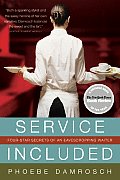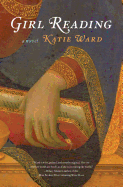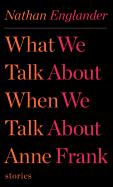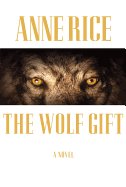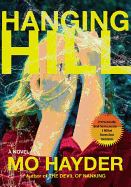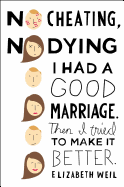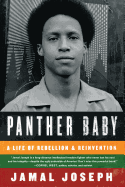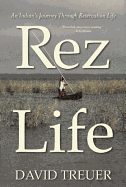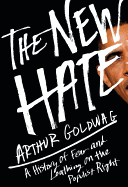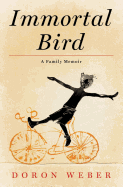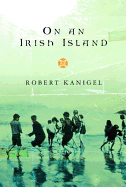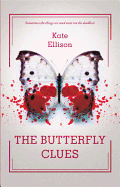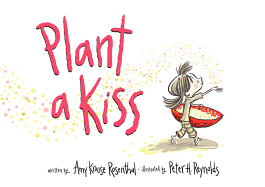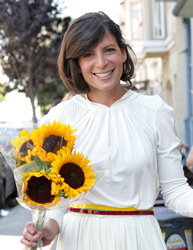 Elizabeth Weil is known for her candid article in the New York Times magazine, "Married (Happily) with Issues," detailing her marriage to writer Dan Duane and her attempts to improve it. If you found yourself wanting to know more, the wait is over. All is revealed in her intimate, warm new book, No Cheating, No Dying. I Had a Good Marriage. Then I Tried to Make it Better (Scribner; see review below).
Elizabeth Weil is known for her candid article in the New York Times magazine, "Married (Happily) with Issues," detailing her marriage to writer Dan Duane and her attempts to improve it. If you found yourself wanting to know more, the wait is over. All is revealed in her intimate, warm new book, No Cheating, No Dying. I Had a Good Marriage. Then I Tried to Make it Better (Scribner; see review below).
In it, Weil opens the door and invites the reader into her world--messy, imperfect, frustrating, loving, caring and honest. Delving into many methods of marriage counseling, she searched for ways to deepen her relationship with her husband.
Several of your chapters are topics some people don't like to talk about: money, religion, sex, family relations. Should we talk about these things before getting married? If not, when?
It's important to talk about things early, to know what each other's expectations are. But Dan and I had a typical pattern. We knew each other only a year or so before we got married. We had a conversation about how we might feel about religion, and raising children, etc.--but you never know what you will do in a situation until you are there. So I think it's important to not say, "We had a conversation when we first got together and we're done, we're decided," because of course we all grow and change.
You have to stay alive to each other. I am more or less the same person I was when we got married, but 12 years have passed and I'd like to think I've matured a bit and I know Dan better.
You say that you and your husband both work from home on your writing and that he is your "first reader." How did that work out for you on this book, which is so much about him?
He read every word probably 20 times. On the one hand, he grew really tired of going over the really painful parts of our life. But on the other hand, the idea that I would publish it without him reading it is so beyond me. I love him and hope it comes through in the book. It's an honest portrait of our un-whitewashed marriage. I hope that his humanity is there, and not just his annoying traits.
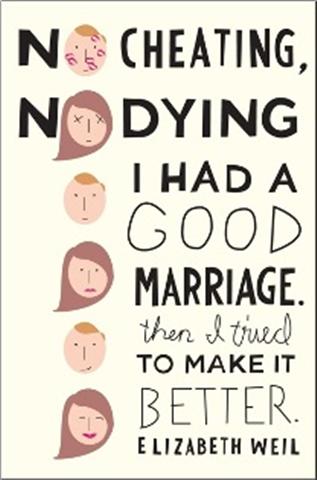 You write about Dan's obsessions when it comes to construction, cooking, bodybuilding... has any of that changed since you wrote the book?
You write about Dan's obsessions when it comes to construction, cooking, bodybuilding... has any of that changed since you wrote the book?
We've grown and mellowed--he is an extremely obsessive person, but he's moved beyond food--now it's triathlons! I'm less obsessive than he is--no contest. Dan has taught himself to be a master chef, he taught himself carpentry. I just go with the flow. I don't have that trait that he has--digging in and getting to the bottom of things.
No Cheating, No Dying refers to the promise you made to each other when you got married. The bar was kind of low! Do you still practice the communication techniques you learned, or do you feel like you've done it all?
Oh, there's no "done"! But there is a time to stop the degree of focus we had. Some day we might go back into therapy, but there won't be a big bar to jump over, and it won't be scary or intimidating. I feel it incredibly helpful to say, "You know what, it doesn't have to be so bad to make it better." On a scale of 1-10, never let it go below a 5 or 6. Just decide that's low enough.
Your New York Times article was intensely personal. How did people react to that level of honesty? And do you expect that with this book?
People had incredibly intense reactions to the article about my relationship with Dan. It's really emotional material. It presses buttons in people's minds and I didn't quite realize that was going to happen until I wrote the essay for the Times. But it became very clear very quickly. While it was not terribly comfortable personally, I felt as a writer that it was a positive.
I went into the project with a mantra: just be totally honest and everything will be okay. Speaking as a reader, if the writer is being honest, I almost don't even care how the book was put together. As a writer I felt it was important to not shy away from what was important. With marriage, it's so private, we really need to hear each others' stories in order get bearings on what is going on in our lives.
How does it feel having the book come out?
It's nice to have some emotional space between the writing and the publication. It's so gratifying hear people say they had a conversation with their partner (after reading the book) and they really connected. That's what I wanted. There's this funny thing with memoirs--a lot of people see it as how could you be so self-absorbed and write a book about yourself? But the whole point is to get people to think about their own lives. Of course my marriage is not hugely important to other people, but their own marriage is. Books give people a way to think and to see the world, so the fact that that seems to be happening a little bit is very gratifying. --Susan Weis-Bohlen, breathe books
Elizabeth Weil: Portrait of a Marriage




 Elizabeth Weil
Elizabeth Weil You write about Dan's obsessions when it comes to construction, cooking, bodybuilding... has any of that changed since you wrote the book?
You write about Dan's obsessions when it comes to construction, cooking, bodybuilding... has any of that changed since you wrote the book?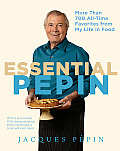 Jacques Pepin can help. In
Jacques Pepin can help. In 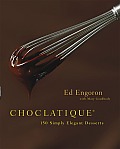 And for dessert? Reach for
And for dessert? Reach for 